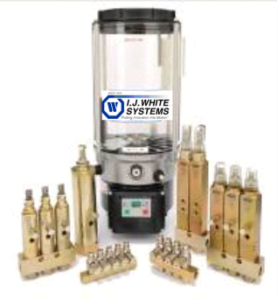Technical Bulletin 3: Lubrication: Bearings and the Use of Greases / Oils
Proper lubrication of the Bearings and moving parts associated with a Spiral System is extremely important to maintaining the life of these parts. The most effective way of maintaining the Bearings and moving parts on the system is to incorporate a Preventative Maintenance Program for your facility.
As part of this program, a regularly scheduled lubrication of the Bearings and making sure all oil levels for the Track and Chain Oilers are maintained. Allowing these items to go without lubrication will sshorten the life of the Bearings, Belt and Drive Chain.
The following are recommendations to address these critical areas for Spiral operation.
BEARINGS
The Bearings are mechanical devices that are used to support loads and reduce friction between moving parts of machines. The friction causes a loss of energy, resulting in extreme amounts of heat buildup within the Bearings, causing mechanical wear. The direct result of this mechanical wear is the premature failure of these bearings.
All metallic bearings are designed to run with some type of lubrication. It is important to do lubricate properly; improper lubrication can also cause premature failure of these bearings. Another major factor is the operating temperature in Ambient (room) or Freezer applications.
BEARING FAILURES
Most Bearing failures are caused by improper lubrication, incorrect mounting, debris buildup, and the lack of routine maintenance:
- Fatigue Failure – This is the flaking or galling of the raceway for the Bearings. The life of a Bearing is usually determined by the speed of operation and the load that is applied.
- Contamination – The sign of contamination is scratching or pitting of the race surface. This contamination is caused by improper lubrication, adverse environmental conditions, water buildup, and airborne dust. The use of a Pressure Washer will force water past the seals, causing rust to form, and will destroy the bearing. Flour in a bakery application can form an abrasive if this is allowed to contaminate the grease in the Bearing, causing premature failure.
- Lubrication Failure – By inspecting the lubricant in a Bearing, you can determine premature failure. If the grease is hard or caked, and changed from the original color, this indicates Lubricant Failure. The lubricating capabilities of the grease have been diminished in this condition. The Bearing will fail due to a lack of lubrication.
The following are common causes of Lubricant Failure:
- Dirty Lubricant
- Too Much Lubricant
- Wrong Kind of Lubricant
The Anti-Friction Bearing Manufacturers Association has outlined the following procedures to prevent the contamination:
- Work with clean tools in clean surroundings.
- Remove all outside dirt from housing before exposing Bearings.
- Handle with clean, dry hands.
- Treat a used Bearing as carefully as a new one.
- Use clean solvents and flushing oils.
- Lay Bearings out on clean paper and cover them.
- Protect disassembled Bearings from dirt and moisture.
- Use clean lint-free rags if Bearings are wiped.
- Keep Bearings wrapped in oil-proof paper when not in use.
- Clean inside of housing before replacing Bearings.
- Install new Bearings as removed from packages.
- Keep bearing lubricants clean when applying and cover containers when not in use.
For more information or to learn about our automatic Auto-Grease System (AGS), call our Technical Service Group at 631-293-2211 or email service@ijwhite.com.
 Auto-Grease System (AGS)
Auto-Grease System (AGS)
Contact our Technical Service Team:
- On-Site System Training
- PM Service Programs
- Cleaning Systems
- Technical Bulletins
- Operations Manuals
- Replacement Parts
Refer to Technical Bulletin 3 pdf for recommended lubricants
